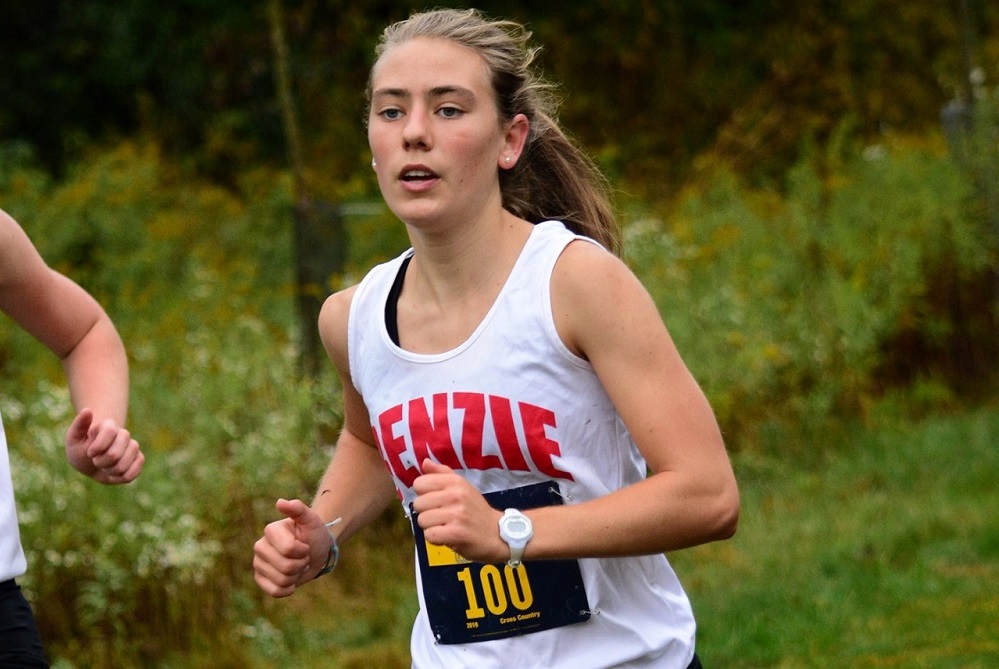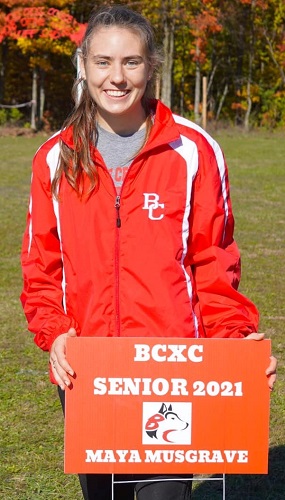
Performance: Hanover-Horton's Judy Rector
September 13, 2018
 Judy Rector
Judy Rector
Hanover-Horton senior – Cross Country
The Hanover-Horton senior has returned from injury to become a two-time MHSAA Finals track champion, and she’s surged into her senior cross country season pacing among the state’s elite in that sport as well. Rector ran a personal-record 18:07.7 on Saturday to win the Class 3 race at Bath’s Bret Clements Invitational and also best the winners of the event’s two larger-school races, earning her the first Michigan Army National Guard “Performance of the Week” for 2018-19.
Saturday was the second time in four races this fall that Rector lowered her personal record, and she’s now dropped 37 seconds from her fastest finish of 2017. As a sophomore, Rector began suffering from slipping rib syndrome – one of her ribs would pop out of place, causing intense pain. She was forced to take six months off from running and missed her track & field season that spring while undergoing physical therapy. She ran again for the first time on the day of the 2017 MHSAA Track & Field Finals, built back her strength for cross country last fall and finished 10th in Lower Peninsula Division 3, and then won the 800 and 1,600-meter LPD3 track championships this spring.
 Rector’s winning time at Bath bested the lineups from the top-ranked teams in both LPD1 and LPD2, plus racers from five more teams ranked among the top 10 in those divisions. She’s got big goals for the rest of this senior year. She’s aiming to run 17:30, which would break the school cross country record set by 2012 graduate Lindsey Burdette, and finish top-three at this fall’s Finals and qualify for the Foot Locker national competition. Next spring, she’ll try to repeat in the 800 and 1,600 and make a run at the 3,200 as well. With only one A- scratching an otherwise perfect academic record, Rector is carrying a 3.99 grade-point average, tied for sixth in her graduating class. She’s still figuring out where, but she’s planning to study biology and continue her running career at the collegiate level.
Rector’s winning time at Bath bested the lineups from the top-ranked teams in both LPD1 and LPD2, plus racers from five more teams ranked among the top 10 in those divisions. She’s got big goals for the rest of this senior year. She’s aiming to run 17:30, which would break the school cross country record set by 2012 graduate Lindsey Burdette, and finish top-three at this fall’s Finals and qualify for the Foot Locker national competition. Next spring, she’ll try to repeat in the 800 and 1,600 and make a run at the 3,200 as well. With only one A- scratching an otherwise perfect academic record, Rector is carrying a 3.99 grade-point average, tied for sixth in her graduating class. She’s still figuring out where, but she’s planning to study biology and continue her running career at the collegiate level.
Coach Dean Blackledge said: “We knew we had a special athlete when she was a freshman. The only one who didn't know was Judy. It took her a while to really understand she's as good as she is. A year and a half ago she was really in the dumps, the whole thing, because she couldn't run. … (But) we worked though the difficult times for her, spent an awful lot of time together, and she got it. When she did finally get through it, she just blossomed into the runner that I always thought she was going to be. She’s just tough in training and self-discipline. When you talk about a cross country runner, the main thing more than in probably any other sport is a cross country runner has to be self-disciplined. They have to get up and run five or six or 10 miles or whatever when other kids are sleeping or whatever, and they have to do that year-round almost. She’s been that kind of athlete. When we do a workout we go out on the roads sometimes to run, and they can cut corners whenever they want and the coach would never know. I don’t think Judy has ever cut a corner. … She’s just a great leader. She has humility, and it’s tough to get an athlete as good as she is that doesn’t boast about themselves. If you want to know something about Judy, you have to talk to somebody else. She won a couple of state championships in equestrian, and I didn’t know that until 2-3 weeks ago – and I’ve been her coach, been close to her, and she’s never said a word about it.”
Performance Point: “My goal going into (Bath) was actually to try to get under 18 (minutes),” Rector said. “Last year when we ran at Bath, I didn't run very well. I was really sick, so this year I wanted to put up a good time because I knew from last year that it was a good course to run. Fortunately it was a lot cooler in the morning, a lot better running weather than we had earlier that week on Wednesday. I was like, we're going to try to maintain a 5:45 split, which would put me just under 18. I have a tendency to go faster at the beginning of my races, and I thought if I tried to even-split it more that it would be better. At the 2-mile I was at 11:35, 11:40, so I knew I was running well at that point. It was just trying to finish going into the last mile. I knew where I was at time-wise, but more than anything I kept seeing my teammates, like the last mile. There were the boys and some of the JV girls – every time I saw them, it makes it easier to keep going. Your teammates are there and they're cheering you on, and they want you to do well. That picked me up a lot for the last part of the race too.”
Comeback trail: “For me, that was a really hard thing. Before I got injured, running was something I enjoyed and I was fairly good at. But when you're supposed to be going to rehab and doing all of those things, you really have to put yourself into it 110 percent. When they ask you to do things like the exercises and stuff, I was like, This is crazy. No way.’ They're like, it will help you. ... Having goals helped me because I'm a really goal-driven person. So coming out of that and not being able to run, I knew I valued it a lot more, just being able to go outside and being able to run and having the ability to do that because some people don't even have that. Having it in my head that I didn't want to take anything else for granted – every time I did a workout or went out to run, it was the best effort that I could do.”
 Finding form: “Last summer was just trying to build up to where I was in the high 18s. This (spring’s) track season was huge for me and getting me the confidence that I could be running faster, not just short distance things but cross country too. Over the past year I've worked a lot on my form and a lot more on basic strength, the little things that I didn't necessarily do before. So I feel a lot more smooth when I'm running.”
Finding form: “Last summer was just trying to build up to where I was in the high 18s. This (spring’s) track season was huge for me and getting me the confidence that I could be running faster, not just short distance things but cross country too. Over the past year I've worked a lot on my form and a lot more on basic strength, the little things that I didn't necessarily do before. So I feel a lot more smooth when I'm running.”
Back on track: “After taking all of that time off, I started running on the day of the (track) state meet a year ago – so it would've been a full year from not being able to run to starting running, to the day I won those two championships. It was really emotional. I never would've imagined being able to do all of that in a year. ... It had always been a goal I had to maybe run and win a state championship, but that I was able to do it, in that amount of time, I was just so happy and proud.”
Future path: “(I’d like to become) a pathologist, someone who researches and studies diseases. I really like science classes. Last year I took a microbiology class that was more based on studying diseases, and we took samples of things from around our school and looked at them and ran tests on them, and I thought was super cool. If I could do something like that or in the medical field, that's a long-term goal for me.”
- Geoff Kimmerly, Second Half editor
Every week during the 2018-19 school year, Second Half and the Michigan Army National Guard will recognize a “Performance of the Week" from among the MHSAA's 750 member high schools.
The Michigan Army National Guard provides trained and ready forces in support of the National Military Strategy, and responds as needed to state, local, and regional emergencies to ensure peace, order, and public safety. The Guard adds value to our communities through continuous interaction. National Guard soldiers are part of the local community. Guardsmen typically train one weekend per month and two weeks in the summer. This training maintains readiness when needed, be it either to defend our nation's freedom or protect lives and property of Michigan citizens during a local natural disaster.
PHOTOS: (Top) Hanover-Horton's Judy Rector leads the way during a race this fall. (Middle) Rector powers down the straight-away during the Track Finals this spring. (Photos by Joe Childs and Marlissa Shepherd, respectively.)

Musgrave's Iron Deficiency Work to Help Athletes 'Know If You're Low'
By
Tom Spencer
Special for MHSAA.com
November 5, 2021
Maya Musgrave wants every female high school cross country runner to know her story. And she wants to help everyone with a similar one.
 Boys, too, should take notice of what the Benzie Central senior has gone through. Her brothers already have. And, they got help.
Boys, too, should take notice of what the Benzie Central senior has gone through. Her brothers already have. And, they got help.
Both the boys and girls Benzie runners have qualified for this weekend’s MHSAA Lower Peninsula Finals. The girls would not have made it without her leadership and contribution to the team. Perhaps the boys wouldn’t have either.
When she graduates in the spring, it won’t necessarily be Musgrave’s running performances people will remember. She’s in the process of starting a non-profit agency to create awareness for anemia and make iron blood testing free for future Benzie runners.
Now to her story. Musgrave started running cross country as a freshman. Her brothers Michael and Quinten also run for the Huskies.
Maya, who will be named to the academic all-state cross country team this weekend, got back into running her junior year, after recovery from an earlier surgery. She ran her best time of the season in the school’s first race.
But, Musgrave’s times dropped every race after. She and her coaches knew it wasn’t her training or effort. She and her family struggled with low energy and breathing difficulties.
 Upon receiving Musgrave’s blood test results, her personal physician actually asked Musgrave how she had been avoiding passing out. Her coaches wondered how it was possible she was staying awake during the day, let alone run.
Upon receiving Musgrave’s blood test results, her personal physician actually asked Musgrave how she had been avoiding passing out. Her coaches wondered how it was possible she was staying awake during the day, let alone run.
Musgrave’s lab revealed she had iron levels just 10 percent of what they should be. She went through two iron infusions to get her levels to normal. Infusions are usually prescribed by doctors to treat iron deficiency anemia, or when needed to increase iron levels fast to avoid medical complications or a blood transfusion. They also are prescribed for iron deficiency anemia when dietary changes and iron supplements are not enough.
Her story has already led to iron testing of the entire Benzie girls team and some of the boys. Low iron levels are very common among female athletes, and to a lesser extent found among male runners. The testing revealed her brothers had low levels, as did half the girls team.
The cost of the testing was covered by Musgrave personally, with help from her family. The next step was to start the education process. She arranged to bring in Abigail Ellsworth, a local neuropathic doctor and acupuncturist, to speak to the team. Ellsworth also had volunteered her time to draw blood for the team testing.
Today, Musgrave is working with an attorney to set up her nonprofit called Know If You're Low. Once it is set up, the nonprofit will provide free iron testing and education for female runners at Benzie on an annual basis.
So others don’t have to, is Musgrave’s motivation.
“I just figured it had been a problem for girls in the past, it was obviously going to be with girls in the future as well, so I might as we’ll tell my friends about it and tell my teammates about it so they can get it checked and not have to worry about it like I did,” she said. “I didn’t want them to have to go through that.”
Her coaches, Asa and Traci Kelly, were among the first to suggest iron could be at the crux of her struggles. They’ve seen a lot of runners struggle with iron counts during their coaching and competitive personal running careers.
“She was at the point where we were consoling her after races and saying, ‘Hey, we’re sure this is what is going on,’” Asa Kelly said. “‘You just got to get tested.’”
Other than the extreme low levels, Musgrave’s story fits a pattern the Kellys have seen too often – watching times get slower without a known cause, thinking perhaps the athlete is not working hard enough and having kids quit the sport because of it.
 “A lot of coaches, a lot of athletes, a lot of parents just don’t understand how critical (iron levels are),” said Asa Kelly. “I think the biggest thing is back 30 or 40 year ago, you would just keep beating the horse.
“A lot of coaches, a lot of athletes, a lot of parents just don’t understand how critical (iron levels are),” said Asa Kelly. “I think the biggest thing is back 30 or 40 year ago, you would just keep beating the horse.
“Low and behold many of these kids had underlying issues.”
The Kellys coach boys and girls cross country at Benzie. Their daughter Mylie broke the school record at the Regional last week and hopes to qualify for the all-state team again this year as a sophomore.
They’ve seen a couple of runners every year test low for iron when it was considered a possible culprit for decreasing performance. They can’t help but wonder what results would have shown if they had tested all the boys and girls every year. Musgrave may make that possible going forward.
“If coaches could be proactive with this kind of thing, imagine the difference in some of the lives of these kids you could make,” Asa Kelly said. “All of a sudden, ‘I just thought I was an OK runner on the team and I was just tired all of the time’ to maybe this kid has this untapped ability they are never going to discover just because of something that’s out of their control.”
Musgrave, who still takes iron supplements, has launched a website, KnowIfYoureLow.com.
“We figured that if people want to know more about this, there probably should be a website for them to go look at it,” Musgrave said. “It’s just a place that A, people can read information about this program, and B, donate if they want to. The money will go for paying for the actual blood test.”
Musgrave is undecided about college plans right how. Her coach believes she could land at one of the nation’s finest academic schools.
“She’s a spark plug,” Kelly said. “She’s a girl that is going to go places in this world for sure.
“She brings that poise, that confidence.”
 Tom Spencer is a longtime MHSAA-registered basketball and soccer official, and former softball and baseball official, and he also has coached in the northern Lower Peninsula area. He previously has written for the Saginaw News, Bay County Sports Page and Midland Daily News. He can be reached at [email protected] with story ideas for Manistee, Wexford, Missaukee, Roscommon, Ogemaw, Iosco, Alcona, Oscoda, Crawford, Kalkaska, Grand Traverse, Benzie, Leelanau, Antrim, Otsego, Montmorency, Alpena, Presque Isle, Cheboygan, Charlevoix and Emmet counties.
Tom Spencer is a longtime MHSAA-registered basketball and soccer official, and former softball and baseball official, and he also has coached in the northern Lower Peninsula area. He previously has written for the Saginaw News, Bay County Sports Page and Midland Daily News. He can be reached at [email protected] with story ideas for Manistee, Wexford, Missaukee, Roscommon, Ogemaw, Iosco, Alcona, Oscoda, Crawford, Kalkaska, Grand Traverse, Benzie, Leelanau, Antrim, Otsego, Montmorency, Alpena, Presque Isle, Cheboygan, Charlevoix and Emmet counties.
PHOTOS (Top) Benzie Central’s Maya Musgrave runs during a cross country race this fall. (Middle) Musgrave is a senior this season and forming a nonprofit to pay for iron deficiency testing for athletes. (Below) Musgrave, far left, with teammates Elise Johnson, Nora Grossnickle, Mylie Kelly, Ava Iverson, Hayley Vanwagoner and Ella Gaylord. (Photos courtesy of Benzie Central cross country program.)

